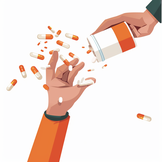Medications for erectile dysfunction treatment.
- Understanding Erectile Dysfunction (ED)
- Underlying Conditions Contributing to ED: High Blood Pressure and Diabetes
- Lifestyle Changes as a Part of ED Treatment: Counseling, Quitting Smoking, and Weight Loss
- Overview of Medications for ED Treatment
- Differences Between ED Medications
- Safety Concerns and Precautions: Nitrate Drugs and Other Medical Conditions
- The Role of a Healthcare Professional in ED Treatment
- Alternative Treatment Options: Injectable Medicines, Suppositories, and Testosterone Replacement Therapy
- Side Effects of ED Medications
- Comprehensive Approach to ED Treatment

Understanding Erectile Dysfunction (ED)
Erectile dysfunction (ED), commonly referred to as impotence, is a health condition that involves consistent difficulty in getting or maintaining an erection sufficient for sexual intercourse. This condition becomes more common as men age but it's not a natural part of aging. Many underlying health conditions can contribute to ED, making it crucial to address these root causes while treating ED.
Underlying Conditions Contributing to ED: High Blood Pressure and Diabetes
High blood pressure and diabetes are two leading health issues that can lead to ED. High blood pressure can damage the arteries, reducing blood flow to the penis and making it difficult to achieve an erection. Diabetes, on the other hand, can cause nerve damage and problems with blood circulation, which can also affect erectile function.
Lifestyle Changes as a Part of ED Treatment: Counseling, Quitting Smoking, and Weight Loss
An integral part of ED treatment involves making certain lifestyle changes. Counseling can help manage anxiety, depression, and other mental health concerns that can contribute to ED. Quitting smoking is crucial as tobacco use can restrict blood flow to veins and arteries, contributing to chronic health conditions that cause or exacerbate ED. Maintaining a healthy weight is also critical as obesity can lead to health conditions like diabetes and high blood pressure that can contribute to ED.
Overview of Medications for ED Treatment
Medications for erectile dysfunction treatment typically involve the use of phosphodiesterase type 5 (PDE5) inhibitors.
These include Sildenafil (Viagra), Vardenafil (Levitra, Staxyn), Tadalafil (Cialis), and Avanafil (Stendra).
These medications enhance the effects of nitric oxide, a natural chemical the body produces to relax muscles in the penis, increase blood flow, and facilitate an erection in response to sexual stimulation.
Differences Between ED Medications
The primary difference between these ED medications is how long they take to start working and how long their effects last. Viagra and Levitra tend to take effect within 30 minutes and their effects can last up to 4-6 hours. Cialis can take effect slightly faster, within 15-20 minutes, and its effects can last up to 36 hours. Stendra is the fastest acting, taking effect within 15 minutes, but its effects typically only last up to 6 hours.
Safety Concerns and Precautions: Nitrate Drugs and Other Medical Conditions
While ED medications are generally safe, they should not be used in conjunction with nitrate drugs, which are typically prescribed for chest pain (angina), as this can lead to a sudden and serious drop in blood pressure. Additionally, these medications may not be suitable for individuals with certain medical conditions, so it is important to disclose your full medical history to a healthcare professional before starting any new medication.
The Role of a Healthcare Professional in ED Treatment
A healthcare professional plays a crucial role in the diagnosis and treatment of ED. They can evaluate your symptoms, recommend appropriate tests, and suggest the best treatment options based on your overall health, preferences, and the severity of your ED. A prescription is necessary for ED medications, which ensures that the use of these medications is done under medical supervision.
Alternative Treatment Options: Injectable Medicines, Suppositories, and Testosterone Replacement Therapy
For some men, alternative treatments may be necessary. These could include injectable medicines like Alprostadil, which is injected directly into the penis to stimulate an erection. ED can also be treated with suppositories, which are small medicated pellets inserted into the urethra.
If ED is due to a hormonal imbalance, testosterone replacement therapy can be beneficial. However, this therapy should only be pursued under the guidance of a healthcare professional, as it can have side effects and might not be suitable for everyone.
Side Effects of ED Medications
Common side effects of ED medications can include headache, facial flushing, upset stomach, and temporary changes in vision. More serious side effects such as an erection that lasts more than four hours (priapism) or sudden vision or hearing loss are rare but require immediate medical attention.
Comprehensive Approach to ED Treatment
To conclude, treating erectile dysfunction often requires a comprehensive approach that addresses underlying health issues, involves lifestyle changes, and may include the use of medications. It's important to work closely with a healthcare professional to find the most effective and safe treatment plan for your needs. Always consult with a healthcare professional before starting any new medication or therapy for ED.
It is also worth mentioning that ongoing research continues to bring forward new and improved treatment options for ED, so maintaining regular appointments with your healthcare provider ensures that you are always receiving the most up-to-date care.



